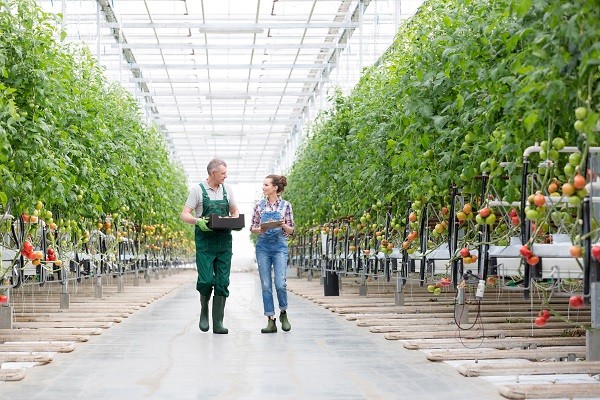
28 Feb
Sustainability has become a critical issue in the horticulture industry, as it is directly linked to the sector’s long-term viability.
While the demand for fresh fruits and vegetables continues to rise, the industry faces various challenges in adopting sustainable practices, such as resource scarcity, environmental degradation, export issues and climate change.
Fortunately, cutting-edge innovation can offer new opportunities to address these challenges and boost sustainability in the industry.
This post will explore the key challenges horticultural exporters face in achieving sustainability and how the latest innovation can help overcome these obstacles, creating a more sustainable future for the industry.
Challenges to Sustainability in Australia’s Horticulture Industry
The horticulture industry in Australia is facing numerous challenges in adopting sustainable practices, and several factors contribute to this predicament.
Here are some of the obvious ones.
Factor I: The Environmental Impact of Horticulture Practices
Excessive Pesticide Use
The excessive use of pesticides can harm the environment and reduce biodiversity, leading to the loss of beneficial organisms and the emergence of resistant pests.
Water Demand
The increasing demand for water in horticulture threatens the availability of this precious resource. It places a strain on local ecosystems, affecting water quality and quantity.
Soil Health
Soil health is essential for sustainable horticulture. Its degradation and erosion can lead to nutrient loss and affect the soil structure. This will affect plant growth and productivity.
Factor II: Economic and Social Challenges
Consumer demand for low-priced produce pressures producers to cut costs, potentially leading to unsustainable farming practices. At the same time, labour costs are also a significant challenge.
As a result, farmers often face difficult choices. This includes overworking themselves or their employees to keep costs low, which can lead to unsustainable farming practices.
Real-Life Use Cases
The impacts of unsustainable horticulture practices are evident across Australia. For example, in the Murray-Darling Basin, using irrigation for horticulture has caused significant environmental damage. This has reduced the river’s water flow and affected local ecosystems and wildlife.
Similarly, in the Great Barrier Reef, farming practices have led to increased runoff, which contains nutrients that contribute to coral bleaching and the reef’s deterioration.
The Way Out
Adopting innovative approaches that balance economic and social considerations with environmental sustainability is essential. This way, the industry can achieve a more sustainable future for the environment and businesses.
Innovative Solutions to Sustainability Challenges
While Australia’s horticulture industry challenges are significant, cutting-edge technologies and innovative practices offer new opportunities to overcome these obstacles and promote sustainability in the sector.
Here are some examples of innovative approaches that are transforming the horticulture industry:
#1: Precision Agriculture
Precision agriculture uses data and technology to optimise crop production and resource use.
It involves collecting and analysing a wide range of data on soil, water, weather, pests, and crops to develop a targeted and precise farming plan.
This plan is then implemented using technology, such as GPS-guided tractors, drones, and sensors, to optimise the use of resources.
These include water, fertiliser, and pesticides for better crop yields and quality.
Here’s how you can benefit by implementing Precision Agriculture as a farmer/Horticulture exporter:
- Respond quickly and efficiently to changes in crop conditions, improving crop health and reducing the risk of crop failure.
- Use resources more efficiently, reducing waste and improving profitability.
- Understand the land and soil better and make more informed decisions about crop management.
- Meet the growing demand for sustainable food products, which is increasingly important to consumers.
#2: Hydroponics
Hydroponics is an innovative approach to growing crops that involve growing plants in a nutrient-rich solution instead of soil.
You grow plants in a controlled environment and deliver nutrients through the water supply. This approach allows precise control over growing conditions, including temperature, humidity, light, and nutrients.
Here’s how you can benefit from this approach:
- Allows for year-round crop production, regardless of climate conditions. As a horticultural exporter, you can grow crops in any season, increasing their potential profits.
- Reduces water use by up to 90% compared to traditional farming methods, as the water is recycled through the system.
- Eliminates the need for pesticides, as there is no soil for pests to live in. This makes it a safer and healthier approach to farming for both the environment and consumers.
#3: Integrated Pest Management
Integrated Pest Management (IPM) focuses on preventing pests from becoming a problem rather than eradicating them once they have infested a crop.
The technique monitors pests to determine their type, distribution, and potential damage levels.
Once identified, you can use various methods to manage the pest populations, including cultural, physical, biological, and chemical control measures.
Here’s how IPM can be advantageous to you:
- Reduces the use of synthetic pesticides, which can have negative environmental and health impacts.
- Minimises the development of pesticide resistance in pest populations, making pest control more effective in the long term.
- Reduces the cost of pest control by using fewer pesticides and promoting the use of natural predators.
- Promotes the health of the soil and beneficial insects, essential components of a sustainable farming system.
Adopting such innovative practices can enhance competitiveness and meet the growing demand for sustainable food products.
How ImpexDocs Can Help
If you are exporting horticultural products, then you would be looking to ensure efficient and smooth operations.
At ImpexDocs, we understand the complexities of global trade operations and are here to help you with your export blues.
Our team of experts can help you manage global trade complexity and keep up with rapidly changing industry regulations.
ImpexDocs being a unified digital platform can manage right from the sales and purchase contracts, order management processes, stock allocations, shipment booking, logistics, shipment management, compliance, and documentation requirements.
With complete visibility and control of your trade operations, you can operate sustainably.
Furthermore, by:
- Streamlining your operations,
- Reducing paperwork and,
- Ensuring compliance;
you can save resources do more with less, reducing process costs and staying competitive.
With ImpexDocs’ comprehensive end-to-end solution for global trade operations, you can adopt sustainable practices regarding your export and focus on growing your business.
If you are looking to optimise your global trade operations and make it up-to 80% more efficient, contact ImpexDocs consultants now using this form.
Final Word
Sustainable practices have become essential for Australian horticulture exporters. Adopting techniques such as hydroponics and IPM can reduce your environmental impact and remain competitive in the global market.
At ImpexDocs, we are committed to helping businesses like yours achieve efficiency in operations and cost optimisation.
Our team of experts has spent countless hours developing an innovative trade tech software suite that enables you to work smarter, not harder.
Our single, unified platform streamlines your global trade execution and management needs, while our end-to-end solution simplifies your global trade operations. With ImpexDocs, you can focus on what matters most – growing your business.
Let us help with your global trade operations.
Contact us today for more information about how we can help you stay ahead of the competition!


